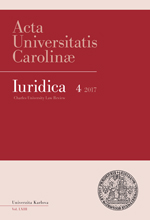Proč nepotřebujeme člověka při legislativním vymezení pojmu fyzické osoby?
Why We Do Not Need a Human Being in the Legislative Definition of the Natural Person?
Author(s): Karel BeranSubject(s): Law, Constitution, Jurisprudence
Published by: Univerzita Karlova v Praze, Nakladatelství Karolinum
Keywords: juristic Person; Person; Personified set of legal norms; point of imputation; Kelsen; Weyr
Summary/Abstract: The aim of this article is to answer the question why we do not need “a man” in the legislative definition of a physical person. The author shows that in the Czech legal order we can identify two different possible approaches how to define according to the law what should be understood as a physical person. The first concept is based on a man to whom belong obligations and rights, while the latter concept is based on the ability to be a bearer of rights and obligations which belong not to a man, but to a physical or juristic person. The author believes that the second construction of a person is based on the pure legal science, which influenced precisely the construction of a person contained in the Civil Code of 1964 – this definition did not need “a man” to define the concept of a person.
Journal: Acta Universitatis Carolinae Iuridica
- Issue Year: 63/2017
- Issue No: 4
- Page Range: 123-135
- Page Count: 13
- Language: Czech

